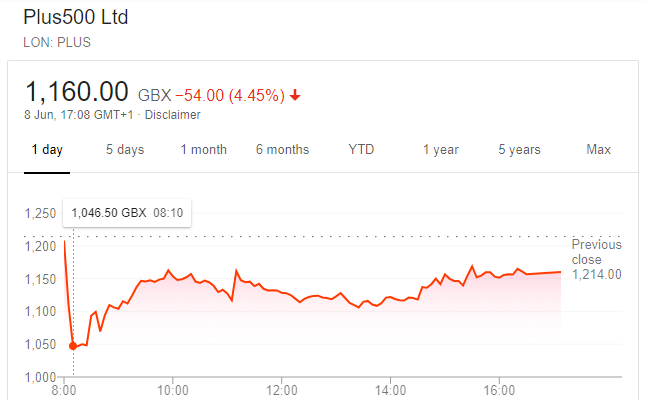Shares of FCA-regulated retail FX and CFDs broker Plus500 traded down by 4.5% on Monday, after the company issued a Q2 Trading Update. Plus500 shares actually fell by about 14% at the open yesterday, before recovering some of the losses.

So what had Plus500 shareholders and traders in a knot?
Plus500’s Trading Update was in our view one of the stranger ones we’ve seen of late. On the one hand, it was a glowing report of things going better than planned at Plus500, presenting metrics which would be the envy of many of its competitors.
More than 100,000 new customers onboarded since the end of Q1, well ahead of expectations. Client deposit levels tripling since year-end 2019 to $488 million. And the company is on track to earn near-record Spread revenue from trading clients, $249 million in the first two months of the quarter.
All in all a very rosy picture at Plus500.
However the one pebble in the shoe in the report was that actual reported revenue so far in the quarter was $102 million, not $249 million. The difference? Profitable customer trades over (mainly) the first week in June ate into spread revenue to the tune of almost $150 million.
Now normally customers making profitable trades should be a good thing for a broker. Even for a B-book broker such as Plus500, which takes the opposite side of clients trades.
However it appears as though Plus500 was not hedging its client book, leading to the large loss for the company in early June.
B-book brokers typically hope that clients’ trades offset. The trading volume at a firm such as Plus500 consists of a large number of (relatively) small trades by large numbers of clients. So, B-book brokers hope that for each client that longs the EURUSD (or S&P500 index, or Amazon CFDs, or Spot Gold….), there’s another client going short, and that way the broker is hedged. At least it is supposed to work in the aggregate, and it normally does.
But on a week like last week when the market is moving in one direction (equities up up up, US Dollar down, crude oil up…) and clients all piling on in that one direction, the broker can be exposed.
So, in most instances, the broker with a (heavily) unbalanced book goes outside and hedges those trades, just like a sports book would do if all its clients bet one side of a match. Many brokers actually automate that process.
But apparently Plus500, either consciously or by accident, didn’t do that. (Most likely the former).
The philosophy at many B-book brokers is that they may have a bad day or week once in a while, but overall there is a cost to hedging (i.e., giving up a good portion of client spread revenue to a third party) which just isn’t worth it since in the long run things will even out.
Overall, it seems like traders in Plus500 stock were somewhat shocked by the size of the unhedged client gains – hence the 14% dip in LON:PLUS shares at the open – but quickly sobered up when they realized that this was likely a one-time thing, with Plus500 still being a fairly potent money making machine. And hence the recovery of most of the dip over the rest of yesterday’s trading session.
Long term, revenues and profitability at retail FX brokers (whether A or B-book) tend to correlate strongly to client deposits, new clients acquired at a reasonable price, market volatility and client trading volumes. And all four of those still align quite nicely for Plus500.